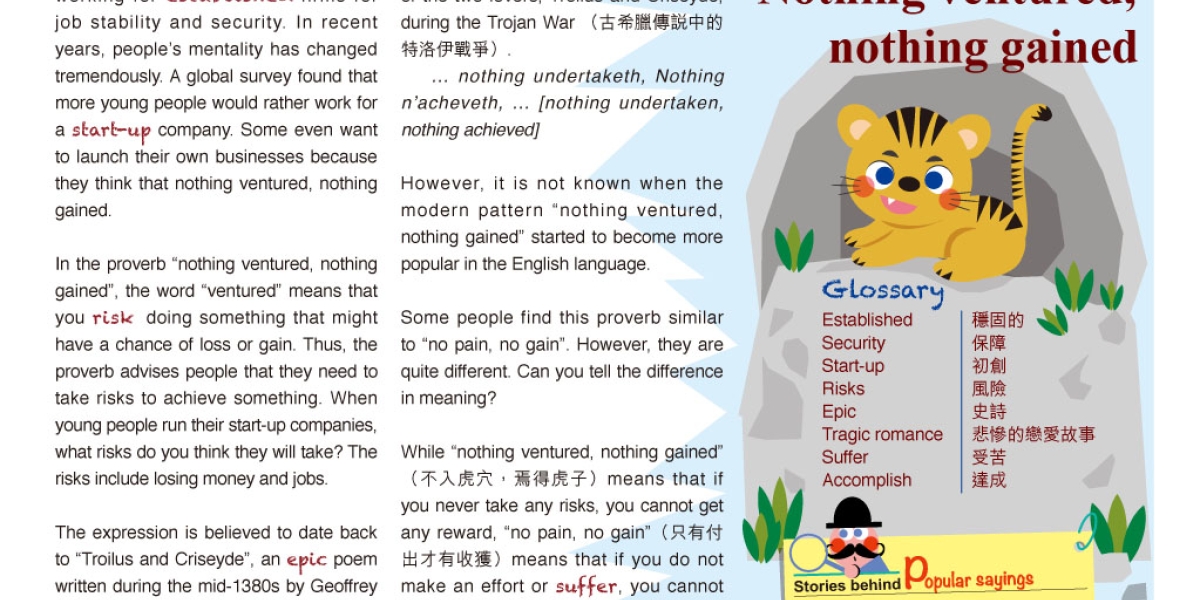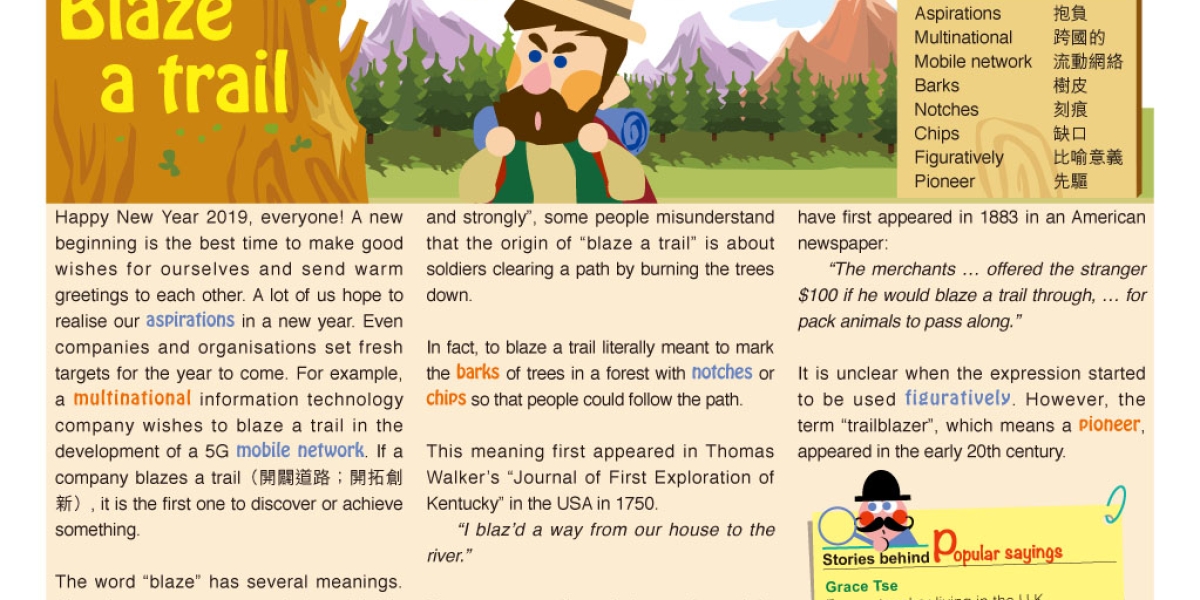昔日文章


Stories Behind Popular Sayings
2019.01.11
Nothing ventured, nothing gained
In the past, many people preferred working for established firms for job stability and security. In recent years, people’s mentality has changed tremendously. A global survey found that more young people would rather work for a start-up company. Some even want to launch their own businesses because they think that nothing ventured, nothing gained.
In the proverb “nothing ventured, nothing gained”, the word “ventured” means that you risk doing something that might have a chance of loss or gain. Thus, the proverb advises people that they need to take risks to achieve something. When young people run their start-up companies, what risks do you think they will take? The risks include losing money and jobs.
The expression is believed to date back to “Troilus and Criseyde”, an epic poem written during the mid-1380s by Geoffrey Chaucer, the greatest British poet. The poem is about the tragic romance of the two lovers, Troilus and Criseyde, during the Trojan War (古希臘傳說中的特洛伊戰爭).
… nothing undertaketh, Nothing n’acheveth, … [nothing undertaken, nothing achieved]
However, it is not known when the modern pattern “nothing ventured, nothing gained” started to become more popular in the English language.
Some people find this proverb similar to “no pain, no gain”. However, they are quite different. Can you tell the difference in meaning?
While “nothing ventured, nothing gained” (不入虎穴,焉得虎子)means that if you never take any risks, you cannot get any reward, “no pain, no gain”(只有付出才有收獲)means that if you do not make an effort or suffer, you cannot accomplish anything.
Glossary
Established
穩固的
Security
保障
Start-up
初創
Risks
風險
Epic
史詩
Tragic romance
悲慘的戀愛故事
Suffer
受苦
Accomplish
達成


Stories Behind Popular Sayings
2019.01.04
Blaze a trail
Happy New Year 2019, everyone! A new beginning is the best time to make good wishes for ourselves and send warm greetings to each other. A lot of us hope to realise our aspirations in a new year. Even companies and organisations set fresh targets for the year to come. For example, a multinational information technology company wishes to blaze a trail in the development of a 5G mobile network. If a company blazes a trail(開闢道路;開拓創新), it is the first one to discover or achieve something.
The word “blaze” has several meanings. Since the most common one is “burn brightly and strongly”, some people misunderstand that the origin of “blaze a trail” is about soldiers clearing a path by burning the trees down.
In fact, to blaze a trail literally meant to mark the barks of trees in a forest with notches or chips so that people could follow the path.
This meaning first appeared in Thomas Walker’s “Journal of First Exploration of Kentucky” in the USA in 1750.
“I blaz’d a way from our house to the river.”
The exact wording of the saying might have first appeared in 1883 in an American newspaper:
“The merchants … offered the stranger $100 if he would blaze a trail through, … for pack animals to pass along.”
It is unclear when the expression started to be used figuratively. However, the term “trailblazer”, which means a pioneer, appeared in the early 20th century.
Glossary
Aspirations
抱負
Multinational
跨國的
Mobile network
流動網絡
Barks
樹皮
Notches
刻痕
Chips
缺口
Figuratively
比喻意義
Pioneer
先驅


Stories Behind Popular Sayings
2018.12.14
Don’t look a gift horse in the mouth
As Christmas is approaching, some Hong Kong people, like the Westerners, like to prepare Christmas gifts for their beloved ones. What kind of gifts do you hope to receive? When you receive one, don’t look a gift horse in the mouth.
The proverb “don’t look a gift horse in the mouth”(不要對禮物諸多挑剔)advises us to accept a gift with gratitude and appreciation.
The expression appeared in a book about English proverbs compiled by a British writer, John Heywood in 1546. Translated into Modern English, it is:
“Where gifts be given freely … No man ought to look a given horse in the mouth.”
A similar meaning in Latin can be traced back to about AD400 in St Jerome’s commentary on “The Letter to the Ephesians”(《厄弗所書》)of the Bible.
“Noli equi dentes inspicere donati” [Never look a given horse in the mouth]
The earlier form, “a given horse”, was shortened to “a gift horse” to fit in the patterns of syllables in a poem written by Samuel Butler in 1663.
He ne’er consider’d it, as loath
To look a gift-horse in the mouth.
In the past, it was a common practice for people to determine the age of a horse by looking at its teeth. If you look a gift horse in the mouth, you want to find out whether this horse is strong and healthy.
In reality, when you receive a gift at Christmas or on your birthday, it is very rude and ungrateful to the giver if you estimate its value by inspecting the gift thoroughly.
p.p1 {margin: 0.0px 0.0px 0.0px 0.0px; text-align: justify; font: 11.0px Helvetica; color: #8c2a97}
p.p2 {margin: 0.0px 0.0px 0.0px 0.0px; text-align: justify; font: 11.0px MHeiHK; color: #8c2a97}
table.t1 {border-collapse: collapse}
td.td1 {border-style: solid; border-width: 1.0px 1.0px 1.0px 1.0px; border-color: #cbcbcb #cbcbcb #cbcbcb #cbcbcb; padding: 1.4px 1.4px 1.4px 1.4px}
Glossary
Gratitude
謝意
Appreciation
謝忱
Commentary
評注
Syllables
音節
Common practice
常見的做法
Determine
斷定
Value
價值
Inspecting
檢查


Stories Behind Popular Sayings
2018.12.07
Cut corners
Recently, a government-appointed commission has investigated whether the workers had cut corners at the Hung Hom Station during the construction of the Sha Tin to Central Link ( 沙中線) railway expansion project.
If you “cut corners”, you do something badly or cheaply. Why are Hong Kong people so concerned about the MTR scandal? The public fear for the safety of the station after news reported that steel bars linking the platform and walls had been cut short.
What does the word “corners” in the expression refer to? A book, a table or a coat? The saying is actually related to a street corner. One of the earliest examples appeared in 1852 in a letter about hunting hare with hounds written by a British author, Knightley William Horlock.
“About a hundred and fifty horsemen were … riding at the top of their speed, … some following the hounds, but a greater number … cutting corners, ….”
The above example illustrates the literal meaning of the expression “cut corners”: When you come to a sharp road corner on a horse or in a car, you go round the corner as closely as possible due to laziness or lack of time.
The metaphorical meaning of “cut corners” became popular in the 20th century. However, when it first appeared remains uncertain.
Let’s hope that companies and organisations will shoulder greater responsibilities rather than “cutting corners”(偷工減料), particularly when handling important tasks. If they bypass some steps, they will cause harm to the lives of the public.
Glossary
Commission
委員會
Scandal
醜聞
Steel bars
鋼筋
Street corner
街角
Sharp
急轉的
Metaphorical
隱喻的
Responsibilities
責任
Bypass
繞過


